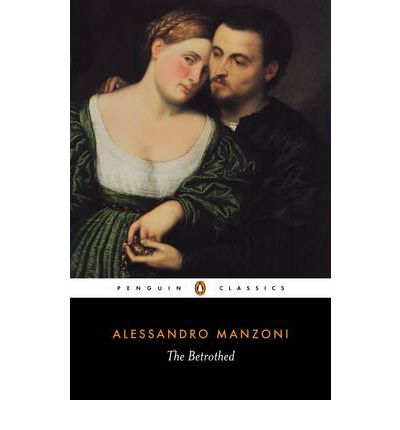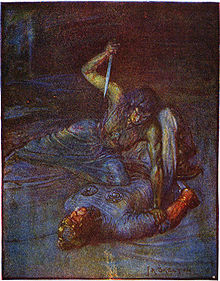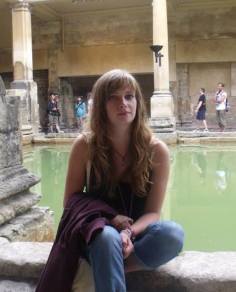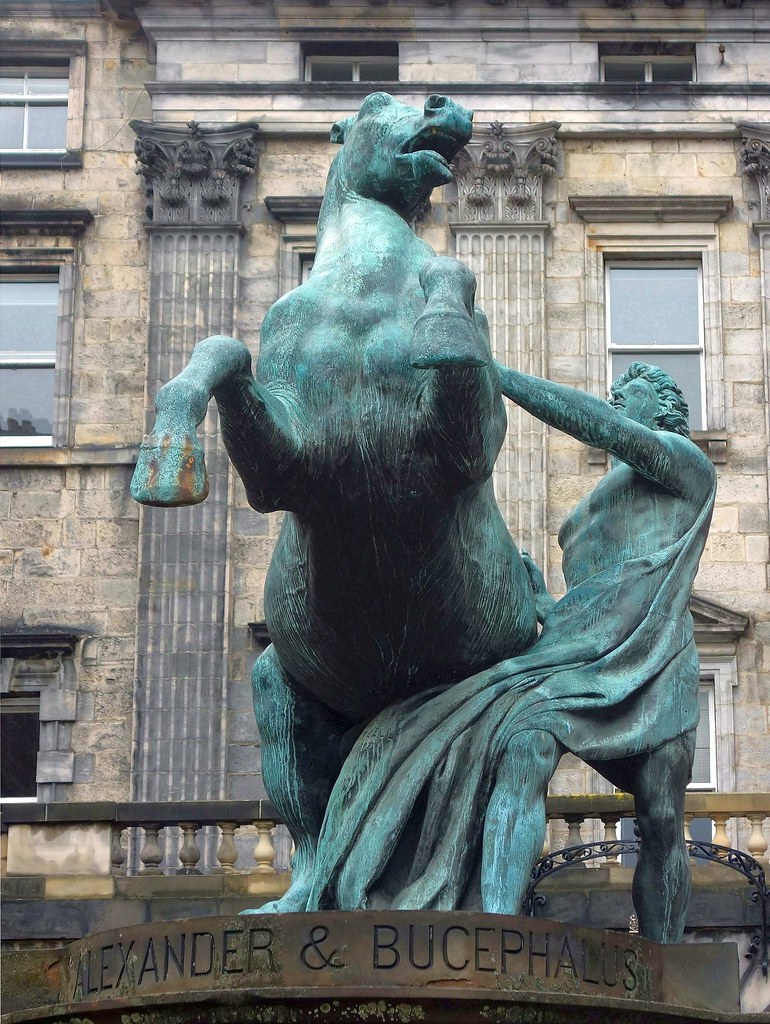A List: Noctes Ambrosianae (The Tavern Sages)...………………………...116/172
B List: Alessandro Manzoni--Il Promessi Sposi (The Betrothed)……………16/668
C List: Alice Hoffman--The Marriage of Opposites...….......………………..72/365
The Noctes Ambrosianae are a kind of fictionalized and one suspects, highly embellished, record of the tavern gatherings of the literary world of Edinburgh circa 1822-1830. Although none of the Scottish personalities represented are widely known today, I was familiar with a few of the names, such as John Wilson and John Gibson Lockhart, the author of Adam Blair, a novel I have actually read. The full collection of the Noctes runs to about 20 volumes, so I found an edition that samples some of the greatest hits. I have no doubt that these guys were very witty, talked a mile a minute, and were a howl to get drunk with if you belonged to this society, but most of the time I admit I don't have any idea what exactly they're talking about. In one session for example, I know that they are talking about the shortcomings of the poet Southey, but the extravagance which some of their flights take, along with the allusions to temporary politics, forgotten magazine writers, the quality of the fowl at other establishments and so on, is usually lost on me.
The Betrothed has traditionally been regarded as the greatest Italian novel, certainly of the 19th century and maybe even of all time. I have only read the beginning of it, but it is striking me as something I am going to like.
Alice Hoffman is a contemporary author of more than 30 books. She is a competent writer I guess, but she isn't very funny, and she adheres closely to the pieties of the times. Her book, like the Noctes Ambrosianae, takes place largely in the 1820s (The Betrothed was written in the 1820s, but is actually set in the 1620s), but her heroine doesn't meekly do as she is told, is educated, fierce of spirit, has a black best friend, etc. In a less polite and enlightened age this would be dismissed as a "woman's novel", probably. Look, I know it is hard to write an interesting book, or, goodness knows, an interesting blog post, or tweet, or Facebook update, or comment or anything else. Maybe this book will grow on me. I don't feel quite entitled to put it aside yet on grounds of being indisputably inferior, as a winner of one of my tournaments. And this is the last book of this type on the C-list for a while, there being a string of titles with much more exalted reputations (albeit all written by white males) coming up.
Friday, July 5, 2019
Wednesday, July 3, 2019
Beowulf (c. 700)
The night that I finished this reading of Beowulf--I think this is the 4th translation/version of it I have gone through--I had a dream which I am certain was influenced by the poem, albeit translated into the slightly less dramatic environment in which I have passed my life. In the dream I was once again back at my college--while I used to have this dream quite frequently I had not had it in several years and thought maybe that experience had become too remote--it was at lunch on Friday (the mead-hall) and I could not remember my schedule, whether I had one class in the afternoon, or even two. In these dreams I always believe that I have a copy of the schedule somewhere up in my room, which I don't seem to have been in, or organized, or done any work in, the entire year. So I went into the dormitory building (the various caves housing the monsters of the story) and walked up the steps to the third floor, at the landing of which I was blocked by two attractive girls in bathing suits (the terrifying enemies?) who had their backs turned to me as they were engaged in conversation with a studly man who was seated on the top step. While I was hardly annoyed by this holdup, a lifetime of social conditioning compelled me to pretend that I would like nothing more than to remove myself from the presence of all of these beautiful people as quickly as possible, so I murmured an "excuse me" and took great care to maneuver my way around the girls in that narrow space without coming close to touching them, which took some doing. As I passed the cool guy he snapped my underwear--I had not been aware up to that point that I was not wearing pants--and then he took off scampering across a large open shower area in the hallway across to wear the rooms were. I was not loath to chase after him as I was bigger than he was--a change since the dreams of my youth, when I was always physically far inferior to my antagonists--but, perhaps due to subconscious awareness of my true age, I was wary of running across the wet floor (the underwater lair of the serpent?) and slipping, and by the time I got across it my tormentor was out of my reach.
The IWE introduction to Beowulf falls among the ranks of its least enthusiastic entries. "The literary value of Beowulf can be known only to students of Old English; to the modern reader this aspect depends on the translation. But Beowulf is important as folklore and the educated man is supposed to have read it." The IWE frequently recommends books under the premise that the "educated man" is supposed to have read it. As one of the great unfulfilled social goals of my life has been to be generally accepted as belonging to the class of educated people I have always taken especial notice whenever these kinds of assertions are made. Of course as you advance through life you eventually realize there is a lot more to it than checking off a list of books read or earning a high score on some examination of learning. The purpose of education when spoken of in this way is to contribute to the overall mental solidity, or gravitas, of the mature person, and if you don't have this then your education has failed you, or perhaps you have failed it, in its most important point.
This is all apart from the circumstance that of the ideas and cultural touchstones that the Educated Man or Woman or Other of 2019 is supposed to be familiar with, Beowulf is at least not very close, I don't think, to the top of the list, though I can imagine a scenario where you are at a party trying to break in with a crowd of educated people, and you have demonstrated an acceptable familiarity with whatever it exactly is that marks one as potentially a member of this class, and you drop in a sly Beowulf reference and it touches something buried miles deep within then and they like it--well, maybe I can't imagine it exactly.
Going back to the dream, it is remarkable how I still have dreams of being of school, which I attended for 4 fast years more than a quarter of a century ago, yet I have worked now in the same place for 22 years (as of next week) and I don't recall ever having a dream about it, or about any of the people there. Does everyone's mind more or less stop being stimulated and receptive to new impressions after age 25 or so, or just mine?
I am not writing very much about Beowulf itself, I know. As I said, I have read now I think four different versions of it. This particular reading came up at a bad time of year, with everyone, including my wife, being out of school, which necessitated my having to set my alarm for 7:30 am just to try to read a few pages before I had people swarming over me and taking over my day. It usually didn't work. On other occasions I was more able to enter into a more Beowulf mindset, appreciative of its status as the oldest surviving major literary work with a direct relation to the later English nation, feeling a more visceral connection with the fierce, cold, dark, watery lives of the medieval tribes of ancient Scandinavia. One's instinct is to think that Beowulf is a strange story, but it really isn't. Our own time is full of stories like this, of singularly courageous and manly heroes possessed of superhuman abilities battling and defeating monsters of vague origin and motivations. The monsters in Beowulf are in a sense easier to understand, actually, given the relative primitiveness of the times and the tiny populations, short lives, vast distances across inhospitable terrain and ocean to get anywhere, endless dark and frigid winters, regular invasions by violent armies. Making anything out of one's life under such conditions required qualities and fortitude that would be considered heroic were anyone to display them today. We, one would think, should be more culturally sophisticated, and perhaps at the highest levels of science and other places where the smartest people in our times congregate, the law and finance and so on, the intellectual dynamic approaches or even surpasses the Athenian or Roman or 17th century Parisian or 18th century London standard--some infer that it does, though not through art, I would not think--but what do our monsters represent (technology? the increasingly impregnable overclass?) and how is the consumer/intended audience (who presumably identifies with the hero rising up to slay these monsters) supposed to respond/understand his relationship to the story?
The Bourgeois Surrender Challenge
The evolution over the six years that I have hosted this challenge of the Google search algorithms that I use to find the contestants for it has become more antagonistic to my purposes, which was to plug in a bunch of random words and see what random things it turned up. But increasingly it is only giving me a small number of "the most relevant" results, which lean heavily to dry academic papers. Perhaps more of this kind of scholarship has been uploaded to the Internet since I devised this game, and its numbers are now overwhelming the possibilities of quirkier "hits" but I think it more likely that the formulas are trying to guess what I "want" to find, but I don't want to find anything specific, I want to find randomness, which was one of the appealing features of the early days of the internet. I may give Google one more Challenge, as Beowulf-like works generate search words that are especially prone to produce gloomy sword and dragon type results, but if I continue to be disappointed I may try a different search engine and see if I can recapture some of the old magic.
1. Jessica Day George--Dragon Slippers #1...………………………………………………...226
2. M. L. Wang--The Sword of Kaigen…………………………………………………………..55
3. James Canton--The Literature Book: Big Ideas Simply Explained...………………………...44
4. Jorge Luis Borges--A Course on English Literature...……………………………………….20
5. Richard A. Knaak--Legends of the Dragonrealm Volume II...……………………………….18
6. Plutarch--The Age of Alexander...…………………………………………………………….13
7. Muammar Al Gathafi--The Green Book...……………………………………………………12
8. Dana Diehl--Our Dreams Might Align...………………………………………………………6
9. H. A. Guerber--Legends of the Middle Ages...………………………………………………...4
10. Patricia Briggs--Dragon Blood...……………………………………………………………..3
11. The Cambridge Companion to Medieval Romance (ed. Krueger)…………………………...2
12. R. Scot Johns--The Saga of Beowulf Book 1: Land of Death and Shadow...………………...1
13. C. Washington Ives--West Indies...…………………………………………………………..0
14. Richard North--The Origins of Beowulf...……………………………………………………0
15. Linda K. Richter--The Politics of Tourism in Asia...…………………………………………0
16. Beamond Authority--Myths and Legends...….……………………………………………….0
17. John Byrns--Spiritual Fire Starters...……….………………………………………………..0
18. The Reunification of Europe: Anti-Totalitarianism, Courage & Political Renewal...……….0
Qualifying Round
I am going to have the 6 entries scoring zero face off against each other to get a field of 15, with top seed Jessica Day George getting a bye through to the round of 8.
#13 Ives over #18 Reunification of Europe
Neither of these books is readily available. The Reunification of Europe book is a multi-author collaboration, and may even be a textbook.
#14 North over #17 Byrns
#15 Richter over #16 Beamond Authority
I'm not sure that the Beamond Authority thing is even an actual book.
Second Round
#2 Wang over #15 Richter
#3 Canton over #14 North
#4 Borges over #13 Ives
#5 Knaak over #12 Johns
#6 Plutarch over #11 Cambridge
#10 Briggs over #7 Gathafi
There is no way I wanted the former strongman of Libya bowing out in his first match, but he was the victim of an upset.
#9 Guerber over #8 Diehl
The H.A. stands for Helene Adeline. Her book is an oldie (1929) but some of the reference libraries in the state still have a copy of it.
Non-Elite 8
#1 George over #10 Briggs
#2 Wang over #9 Guerber
Wang has an upset to use as well.
#6 Plutarch over #3 Canton
Canton looks to be one of those modern Big Ideas kinds of guys--there is another book that appears to be by him called The Extreme Future: Top Trends That Will Shape the World, etc. The books are fairly similar in size. I have read all of Plutarch's Lives, albeit some years ago now, already, but I went with him anyway because it is easier for me to get a free copy of that book than of the other.
#4 Borges over #5 Knaak
Final Four
#6 Plutarch over #1 George
#4 Borges over #2 Wang
Two of the all time greats versus a couple of (probably) formulaic contemporary children's books? Please.
Championship
#6 Plutarch over #4 Borges
I probably would have picked Borges if any of the libraries I use had had a copy of his book. But none of them do.
Subscribe to:
Comments (Atom)









